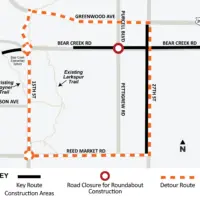
Continuing to respond to a shrinking food supply, NeighborImpact has announced cancellation of two food distribution programs in the region. A mobile pantry distribution in Redmond currently based at the American Legion and providing food to an average of 277 individuals monthly will cease after May 29. A second produce distribution program, Fresh Express Home Delivery, will also end June 27. That program feeds 380 homebound individuals each month.
NeighborImpact previously announced that reductions in federal commodity distribution have reduced the food supply to the region. NeighborImpact’s 59 partner food pantries were informed on March 21 that food supplies would be reduced by approximately 17 percent going forward unless and until commodity distribution through the federal Commodity Credit Corporation is resumed. In April, the reduction in food supply was even more severe than expected—25 percent.
Food distributed by NeighborImpact is sourced from federal commodities distributed through the Oregon Food Bank, local grocery stores, and community donations. NeighborImpact purchases additional food each month to provide a consistent source of groceries to food insecure Central Oregonians. As the regional food bank, NeighborImpact gathers more than 4 million lbs of food annually and redistributes it through partner agencies and its own mobile pantry program. Partner agencies collect another 2.4 million lbs to supplement the food obtained through NeighborImpact. The system as a whole is feeding around 80,000 people monthly.
“We are very sorry to have to discontinue these distributions,” said Carly Auten, Director of Food Programs for NeighborImpact. “We know how important they are. Food bank visitors tell us at every distribution why the food they receive is essential to balancing household budgets and supplementing SNAP purchases with healthy and nutritious alternatives that often can’t be afforded with their current income and high living costs. We’ve put this off as long as we can, but the food just isn’t there despite spending thousands of dollars a week to fill in the cuts from the federal level.”
NeighborImpact has been signaling to federal and state legislators that a reduction in federal commodities would eventually mean a reduction in food distribution in the region, said Scott Cooper, Executive Director of NeighborImpact. He also expressed concern about continuing federal talk of reducing SNAP benefits, reducing housing subsidies and reducing help with energy assistance. “Those types of cuts mean more money out of pocket and that means more pressure on local food banks,” Cooper said.
“Our system was designed to be a supplement to SNAP benefits, not to replace them. Faith and philanthropy partners have been amazing at supporting us as the food system has expanded,” Cooper said, “but there isn’t much more capacity there, especially in light of the many other cutbacks to which they are being forced to respond.”
Auten said, “Unless we see a change in food supply at the federal level or an increase in community donations, these cutbacks could be just the beginning of changes to free food distributions in Central Oregon.















